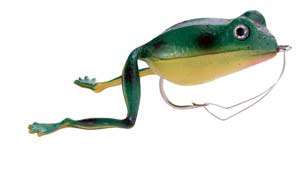
The soft plastic frog craze that took off with such a vengeance in the 2000s didn't actually start with the Zoom Horny Toad. It didn't start with the Snag Proof Frog, either.
It began in 1957 in a Massachusetts dentist's office. Five-year-old Beth Plummer was getting a checkup and had been promised a toy if she didn't cry. Her prize was a little frog with a rubber bulb that made the toy hop when it was squeezed.
That night, her father Bill saw the frog and said, "This would make a terrific lure." He "borrowed" the toy, installed a weedless hook that he had patented a few years before, and took it fishing on the Sudbury River.
And it caught bass.
Plummer located the manufacturer in Japan and ordered hundreds of the fake amphibians. He was still employed as a flight instructor at the time, but would get up at 3:00 a.m. and make frog lures until 5:00 a.m., before heading out to the Westboro Airport. After work and on weekends, he visited tackle dealers, trying to convince them to carry his frogs in their stores.
After two years of early rising and frog marketing, Plummer got the break he was waiting for when Harrison-Hoge Industries called and offered to manufacture and sell his frog (as well as whatever other baits he conceived). In return, Plummer got a weekly commission check.
Sales boomed. In 1968, Harrison-Hoge added Plummer's Water Demon (bottom bumping bait) to their catalog. In 1973, they added the Plummer Banshee (a spinnerbait with a soft plastic head) to the mix. Both made some money, but it was the SuperFrog that made Plummer a millionaire and gave him the freedom to fish six and seven days a week for the rest of his life.
"Even my mother doesn't understand what I do," Plummer told Sports Illustrated in 1978. "She thinks I don't do anything — that I just go fishing. But I'm in an honorable profession. I fish, and I invent lures."
Alex Langer, another lure inventor, considered Plummer one of the best bass anglers of all time, saying, "Bill Plummer has probably caught more bass than anyone in history. … From ice-out to ice-in, Bill fishes five to seven days per week and has done so for over 30 years."
Financial independence may have changed how often Plummer got to fish, but it didn't change his methods. He hated tournaments and most of the modern trappings of bass fishing. His boat was a 12-foot car topper that he designed himself. On the back of it, he clamped a 3-hp Evinrude. He didn't use an electric motor, preferring to propel himself with oars.
"Those fancy boats are too heavy for carrying in to remote ponds," he said, "and so what if my seats are low and less comfortable than some? I'm also less visible to the fish, and I don't need a big motor because I'm not competing with other big motors."
Plummer used just four lures to catch the bulk of his bass: his SuperFrog, Banshee and Water Demon plus jigs. He didn't need anything else. He caught well over 1,000 largemouths weighing better than 5 pounds, including hundreds weighing more than 6 or 7 pounds, and he caught almost all of them from small New England waters.
He was an early proponent of catch and release. For more than 40 years prior to his death, he released every fish he caught.
In 2006, Plummer was inducted into the National Freshwater Hall of Fame as a legendary angler.
Plummer died a year later at his Marlborough, Mass., home on March 30, 2007. He was 85. Harrison-Hoge still manufactures a variation of Plummer's legendary SuperFrog. They call it the Superior Frog.

